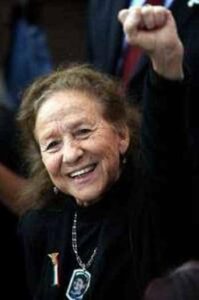Rosario Ibarra: Mexican Socialist Feminist, 1927-2022. Presente!

 Rosario Ibarra de Piedra, one of the most important figures of the Mexican left, died on April 16, 2022 at her home in Monterrey, Nuevo Leon at the age of 95. She was the leader of the Mexican human rights group Eureka Committee of the Disappeared and was the first woman candidate for the Mexican presidency in 1982 as the candidate of the Revolutionary Workers Party (PRT). She ran a second time in 1988. In 2006, thanks to proportional representation, she was elected to the Mexican Senate where she served first as the PRT Senator and then as Labor Party (PT) Senator.
Rosario Ibarra de Piedra, one of the most important figures of the Mexican left, died on April 16, 2022 at her home in Monterrey, Nuevo Leon at the age of 95. She was the leader of the Mexican human rights group Eureka Committee of the Disappeared and was the first woman candidate for the Mexican presidency in 1982 as the candidate of the Revolutionary Workers Party (PRT). She ran a second time in 1988. In 2006, thanks to proportional representation, she was elected to the Mexican Senate where she served first as the PRT Senator and then as Labor Party (PT) Senator.
Ibarra became a human rights activist after her son Jesús Piedra Ibarra disappeared on April 18, 1975, presumably kidnapped, tortured, and murdered by the Mexican government as happened as well to 500 others during the 1960s and 1970s. He was a member of the September 23 Communist League (LC23S), a clandestine urban guerrilla group that engaged in violent attacks against wealthy institutions and individuals and opposed the ruling Institutional Revolutionary Party.
Following her son’s disappearance, Rosario Ibarra, together with 100 mothers of the disappeared, created the Committee in Defense of Prisoners, the Persecuted, the Disappeared, and Political Exiles. After succeeding in finding out the fate of 148 such disappeared people, they changed the organization’s name to Eureka, meaning we have found them.
Years of fighting for human rights turned Ibarra into a public figure. In 1982, the small new Trotskyist Revolutionary Workers Party (PRT) asked her to be its presidential candidate, the first woman to run for the country’s highest office. She held election rallies throughout the country speaking about the needs of working people and the need for a socialist alternative. It was in that campaign that she defined herself as a socialist feminist, running as the candidate of the common working woman and housewife.
Miguel de la Madrid of the Institutional Revolutionary Party (PRI) won the presidency that year in a typically corrupt election with 75 percent of the vote, the Conservative National Action Party (PAN) receiving 15 percent. But Ibarra received 416,488 votes or 1.77% of the total, about half as many votes as the long established and much better known Mexican Communist Party. Her campaign served both to enhance her reputation and to put the PRT on the political map.
Six years later, she ran again, but with Cuauhtémoc Cárdenas, son of Mexico’s legendary president Lázaro Cárdenas running for president she received few votes.
Ibarra was a magnificent orator in the dramatic Mexican style whose speeches, with their long perorations inspired her audiences. As her interpreter at a large public meeting at the United Electrical Workers union hall in Chicago in the 1980s, I was both thrilled and challenged to put her dramatic speech into English, especially when it was constantly interrupted by the applause and cheers of her audience.
From the 1970s until her death, Ibarra remained active in all of the causes of Mexico’s working people and the oppressed whether as a private person or after 2006 as a Senator.
In 2019, when the Mexican Senate voted to honor her with the Belisario Dominguez award for human rights work, she had her daughter Claudia Ibarra return the medal to Mexican President Andrés Manuel López Obrador, saying she could not accept it until Mexico learned the truth about its disappeared, who now number nearly 100,000 — 98% of them from 2006 onward, disappeared during an era of the government’s war on drugs.